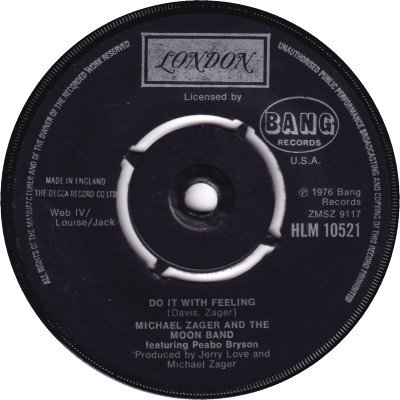
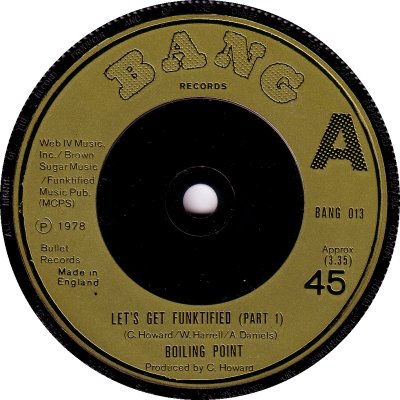
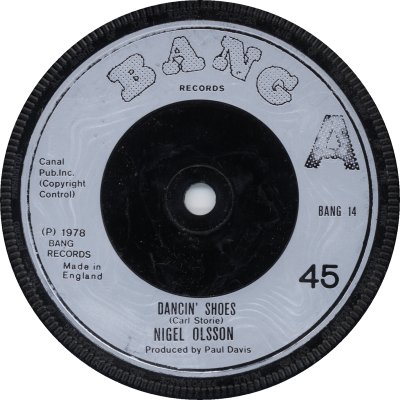
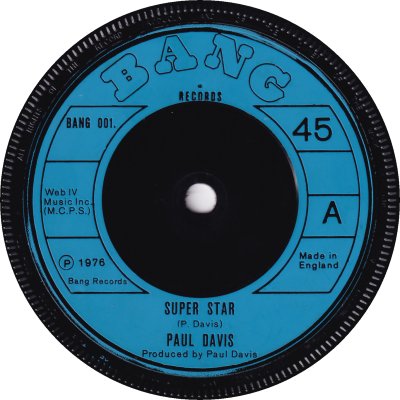
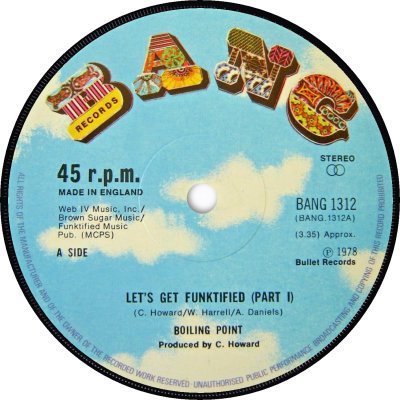
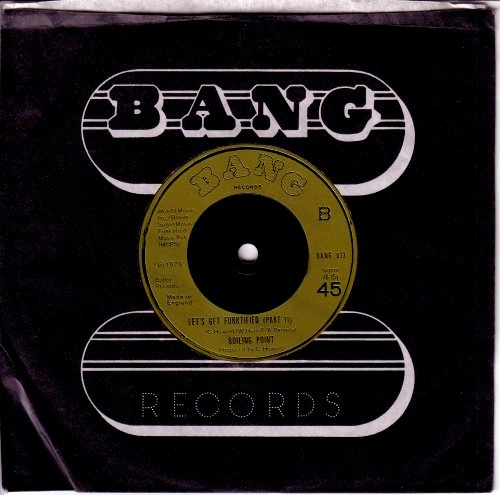
American. Bang was started in 1965, in Manhattan, by Bert Berns, with help from three of his friends from Atlantic Records - Ahmet and Neshui Ertegun and Gerry Wexler. The label's name was made up out of the initials of the first names of the four of them. 'Billboard' of the 29th of May described Bang as a newly-formed subsidiary of the Web IV publishing company which the four men had recently set up; Julie Rifkind had been appointed general manager, and the first single was due out that week. The article added that Berns was in London as part of a trip during which he intended to record material for the label and set up foreign affiliations and licensing arrangements; he was also on the lookout for licensing rights for both Bang and Atlantic from European sources. Under Rifkind, Bang enjoyed early Chart successes with The McCoys and The Strangeloves, but he left in December to join a company called 'Boom' and was replaced the following month by ex-Atlantic man Juggy Gales.
Bang, which was described as 'hot' in BB of the 5th of March 1966, introduced a new label, 'Shout', in the summer of that year. 'BB' of the 25th of June said that Shout was to be dedicated to R&B and that artist and production deals were being sought for it. 1966 also saw Neil Diamond enjoy his first hit for Bang, in the form of 'Cherry Cherry', and release his first album for them. The following year 'BB' of the 11th of February reported that Berns was planning to expand both Bang and Shout. As part of those plans the company had signed Van Morrison, formerly with Them. Perhaps less notably, Bang released a set of twelve albums dealing with the signs of the Zodiac; they came out on another subsidiary label, Astro ('BB', 16th December 1967).
Not long into 1968 Bang received a heavy blow with the death of Bert Berns. 'BB' of the 20th of February revealed that the company's director of sales and promotion Bill Darnell had had the job of general manager added to those responsibilities, but Burns' widow Ilene took charge of the over-all running of the company. A less serious loss followed in April, when Neil Diamond moved to Uni Records ('BB', 20th April 1968). Darnell was replaced by Harold Berkman in the summer. 'BB' of the 16th of November was able to report that there had been a 'complete revival' of Bang and Shout during the fifteen weeks that Berkman had been general manager and that he had been named as vice president. Despite his impact he was replaced by Buzz Bennett as general manager some five months after that article appeared ('BB', 15th March 1969). Ilene Berns continued to push the company along, and her efforts bore fruit, to the extent that 'BB' of the 19th of April 1969 was able to claim that Bang had 'picked up momentum' under her, thanks to a series of artist signings, production arrangements and master deals.
There was another change of management in 1970, when Eddie Biscoe was appointed vice president - he had been in charge of promotions at White Whale records ('BB', 15th August). A fortnight later 'BB' of the 29th gave his position as vice president and general manager. He soon made an impact, completing distribution deals in Britain, Canada, West Germany, Holland, South Africa and Australia ('BB', 23rd January 1971) and also in Scandinavia ('BB' 13th March). In a retrospective, 'BB' of the 25th of May 1974 was able to describe 1971 as being Bang's biggest year ever, with three hits singles and three hit albums. In addition a 'Solid Gold' label was launched, to make the most of the company's back catalogue, and the Shout label, which had been dormant, was revived. 1971 was also the year in which Bang moved from New York to Atlanta. On a more personal level Biscoe was made president of Bang and he married Ilene Berns.
1974 was supposed to see the introduction of a new 'contemporary' label, Bullet. 'BB' of the 5th of February announced that the first signing for it had been made, in the shape of Jim Single, but in the event Single's records came out on Bang. Bullet eventually made its debut in 1976 and served as a Disco / Funk label until it expired in 1978. There were more Chart entries: Paul Davis, who had been on Bang's books since 1969, repaid Ilene Berns' faith in him - it was she who signed him originally - by supplying several hits in the mid and late '70s, and Funk bands Brick and the Muscle Shoals Horns both enjoyed the first of several hits in 1976. In 1977, however, Biscoe left Bang and moved to Los Angeles to start a new label. Ilene Berns was 'rumoured' to be taking charge at Bang but was 'unavailable for comment' according to 'BB' of the 5th of February. A couple of years later she sold the company's name and its masters to CBS. She attempted to start another label, 'Bang II', in 1998 ('BB', 16th May) but it proved to be short-lived.
In the UK, Bang's records were licensed to other companies for the first ten years or so of its existence. Its second single, 'I Want Candy' b/w 'It's About My Baby' by The Strangeloves, came out on EMI's 'Stateside' label (SS-446' 7/65); then BB' of the 28th of August revealed that the company had made a deal with Andrew Oldham for some of its products to come out on his Immediate label. 'Hang On Sloopy' b/w 'I Can't Explain It' by The McCoys (IM-001; 8/65) provided Immediate with its first single and its first hit; subsequent records by that group continued to come out in Immediate until the start of 1967. Other Bang records appeared on Decca's 'London' label from 1965 to 1968. Early in 1971 President gained the rights to Bang records ('Music Week', 16th January 1971), but the agreement seems to have been fairly short-lived and not particularly fruitful. By March 1973 Bang products were coming out on London again, and they continued to do so until the late Spring of 1975. During this second period with London the Bang logo featured on the labels (1); during the earlier period and the time with President, Bang's name had been limited to a mention in the credits.
Bang made its debut as an actual label here in 1976, after signing a licensing deal with Phonogram in September of that year ('MW', 11th September). Although Paul Davis failed to repeat the success here that he had managed in the States, Bang made its mark with minor Disco hits in Brick's 'Dazz' b/w 'Dazz - Long Version' (BANG-004; 1/77), which got to No.36, and Boiling Point's 'Let's Get Funktified Parts 1 & 2' (BANG-013; 5/78), which stalled at No.41. It put its final single out in November 1979, after which, with the sale to CBS, it presumably became redundant. Under CBS the American label lasted until at least late 1982, though it appears to have been reduced to an outlet for records by Brick for the most part. Bang's singles were numbered in the BANG-000s here for much of its life, the first '0' being dropped in 1979. Manufacture and distribution were by Phonodisc, which explains the dull injection moulded labels. The labels were generally coloured gold (2) but the occasional one in a different colour can be found (3). Blue-labelled copies of the first single with a Phonogram 'grid' (4) are actually mispressings - the two tracks on the single are by a band called Ellison Chase, and they came out on Philips around the same time. 12" singles had paper labels and thus were able to feature the exuberant design that was used in the USA at the time (5) - thanks to Nicholas Hough for that scan. There was a company sleeve (6).
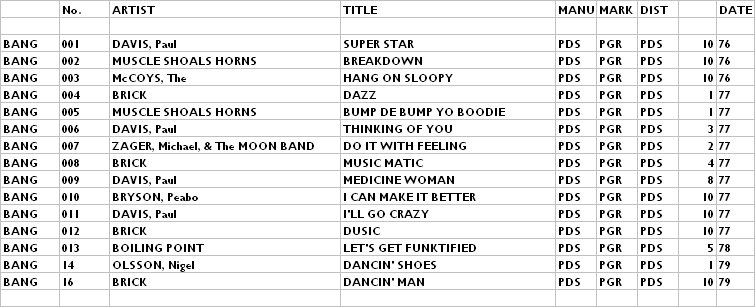


Copyright 2006 Robert Lyons.

